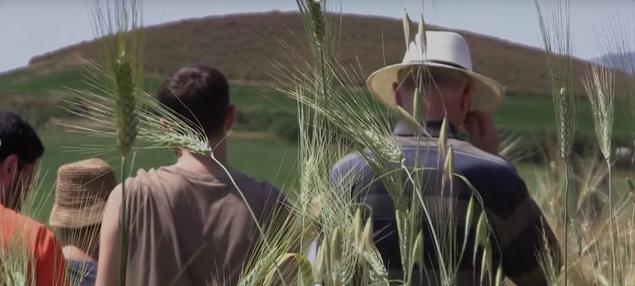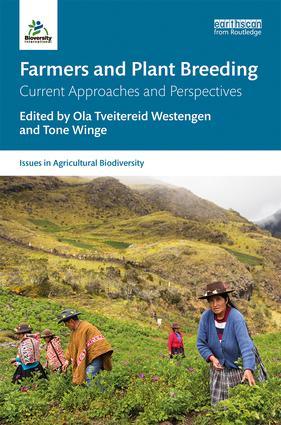New book: Teaming up for sustainable farming and improved food security

This new book focuses on how farmer–breeder collaboration in plant breeding can provide hands-on solutions for improved, global food security, sustainable agriculture and climate-change adaptation.
 Farmers and Plant Breeding: Current Approaches and Perspectives, published by Routledge this autumn, has been edited by FNI Senior Research Fellow Tone Winge together with Professor Ola Westengen of the Norwegian University of Life Sciences (NMBU). It gives an overview of a wide range of collaborative breeding programmes around the world. On-the-ground-cases are linked to international contexts, such as the Plant Treaty, trade agreements, and related intellectual property rights (IPR) regimes, and to regional and local conditions, including national seed policies and laws.
Farmers and Plant Breeding: Current Approaches and Perspectives, published by Routledge this autumn, has been edited by FNI Senior Research Fellow Tone Winge together with Professor Ola Westengen of the Norwegian University of Life Sciences (NMBU). It gives an overview of a wide range of collaborative breeding programmes around the world. On-the-ground-cases are linked to international contexts, such as the Plant Treaty, trade agreements, and related intellectual property rights (IPR) regimes, and to regional and local conditions, including national seed policies and laws.
What is participatory plant breeding? Short video
Key to adaptation
 While traditional breeder-directed breeding programmes have been effective at developing crop varieties for farming systems that are fairly homogeneous, they have proven far less effective in areas where farming is more risk-prone and complex. As stated by the EU-funded international research programme Diversifood: 'the effects [of participatory plant breeding] on both biodiversity and crop production are impressive.'
While traditional breeder-directed breeding programmes have been effective at developing crop varieties for farming systems that are fairly homogeneous, they have proven far less effective in areas where farming is more risk-prone and complex. As stated by the EU-funded international research programme Diversifood: 'the effects [of participatory plant breeding] on both biodiversity and crop production are impressive.'
Related reading: Can teamwork yield better crops?
This new book from FNI documents these impacts, noting increased yields, farmer empowerment in the processes of innovation and development, and to the maintenance of crop genetic diversity and adaptation to climate change.
Case studies include collaborative sorghum and pearl millet breeding for water-stressed environments in West Africa, participatory rice breeding for intensive rice farming in the Mekong Delta, and evolutionary participatory quinoa breeding for organic agriculture in North America.
Broad relevance
Farmers and Plant Breeding: Current Approaches and Perspectives was launched in Rome in November, during a side-event to the Plant Treaty’s 8th Session of the Governing Body.
It is relevant to a wide range of readers, including practitioners with experience in plant breeding and crop genetic resources, readers with a broader interest in agriculture and development, as well as students of international cooperation and sustainable development.
This timely and remarkable book focuses on collaborations between farmers and plant breeders across all types of agroecosystems, and offers real hope for widespread redesign and transformation.' Professor of Environment and Society at the University of Essex, Jules Pretty.
‘This book will be of interest not only to researchers working directly on crop improvement, but also to policy makers and other professionals involved in food and nutritional security.’ Segenet Kelemu of the International Centre of Insect Physiology and Ecology in Kenya.
